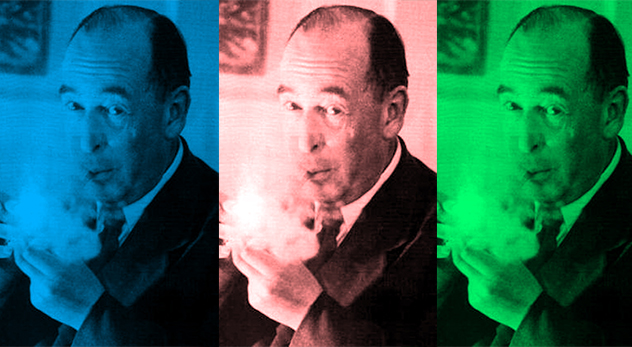When most Christians think of C.S. Lewis, they probably picture a reserved Englishmen in a tweed suit with a pipe protruding from his lips. They may be surprised to find out he lived secretly with a woman for years. Or that he loved to drink. Or that he may have been, in the words of CNN’s John Blake, “so turned on by S&M that he once asked people at a party whether he could spank them.”
But Lewis’ fan club might be surprised by more than his personal life. Here are five quotes from the Narnia author that might make some Christians scratch their heads:
1. Lewis on Scripture: Though he held a high view of scripture, he might have deviated from some modern conservative Christians’ understanding of what that means. Shortly before he died, Lewis commented in Reflections on the Psalms, that Christians “still believe (as I do) that all Holy Scripture is in some sense—though not all parts of it in the same sense—the Word of God.”
2. Lewis on sexual chastity: Aside from living with a woman with whom he was likely sexually intimate, Lewis’s pragmatic view of chastity might have been unsettling to pietistic Christians, who tend to be rigid in their sexual standards. In Mere Christianity, Lewis sounds quite pragmatic when he says, “We may indeed be sure that perfect chastity—like perfect charity—will not be attained by any merely human efforts. We must ask for God’s help. Even when you have done so, it may seem to you for a long time that no help, or less help than you need, is being given. Never mind. After each failure, ask forgiveness, pick yourself up, and try again.” He went on to say that this doesn’t mean Christians should not strive for “anything less than perfection” in sexual holiness.
3. Lewis on Genesis: Whether Lewis believed in evolution by the time of his death is a matter of debate. He stated earlier in life that he had no problem with Darwinian explanations for the origins of life, and we know that Lewis refused to write a preface for an anti-evolutionary work, claiming he wasn’t qualified. When it came to the first book of the Bible, Lewis said, “I have therefore no difficulty in accepting, say, the view of those scholars who tell us that the account of Creation in Genesis is derived from earlier Semitic stories which were Pagan and mythical.” (It’s important to note that for Lewis, “myth” is not a deception, but an imaginative way of transferring truth.)
4. Lewis on atonement: Many Christians have strong and specific views on what Christ’s sacrifice means and what it accomplished. Lewis, however, seemed to be more vague. In Mere Christianity, Lewis admitted not knowing how the atonement worked: “The central Christian belief is that Christ’s death has somehow put us right with God and given us a fresh start. Theories as to how it did this are another matter. A good many different theories have been held as to how it works; what all Christians are agreed on is that it does work.”
5. Lewis on hell: It is uncertain whether the British writer believed, as many conservative Christians do, that hell is a place of eternal and conscious punishment for the damned or if Lewis believed in annihilation—that those who go to hell eventually cease to exist after paying for their sins. In The Problem of Pain, Lewis wrote the following:
Destruction…means the unmaking, or cessation, of the destroyed. And people often talk as if the ‘annihilation’ of a soul were intrinsically possible. In all our experience…the destruction of one thing means the emergence of something else. Burn a log, and you have gases, heat and ash. To have been a log means now being those three things. If soul can be destroyed, must there not be a state of having been a human soul? And is not that, perhaps, the state which is equally well described as torment, destruction, and privation? You will remember that in the parable, the saved go to a place prepared for them, while the damned go to a place never made for men at all. To enter heaven is to become more human than you ever succeeded in being in earth; to enter hell, is to be banished from humanity. What is cast (or casts itself) into hell is not a man: it is “remains.”
He goes onto say, “That the lost soul is eternally fixed in its diabolical attitude we cannot doubt: but whether this eternal fixity implies endless duration—or duration at all—we cannot say.”
Would C.S. Lewis’ views on hell or any of the above topics have earned him a “Farewell, C.S. Lewis” tweet were he alive today? That’s anyone’s guess. But certainly Lewis was more complicated and his views more nuanced than the picture history has painted.






